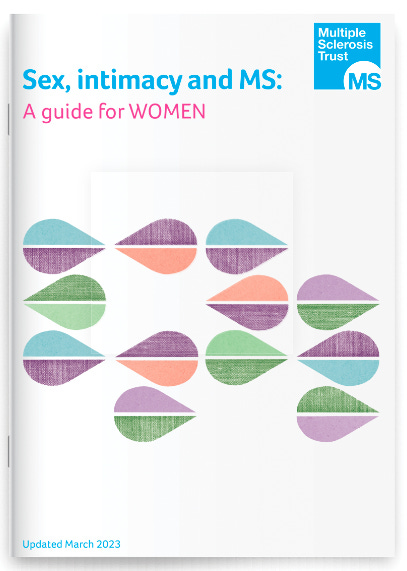Female sexual dysfunction in multiple sclerosis
How big is the problem? Can it be effectively managed?
I was asked last week why there is comparatively less research into sexual dysfunction in women compared to men with MS. A quick search suggests that sexual dysfunction in MS is understudied in both sexes. However, men with MS benefit from the large body of research outside of MS that has developed effective treatments for erectile dysfunction in men.
Cognitive biases
About a year ago, my MS nurse specialist pointed out that I tended to ask men if they had sexual dysfunction and not women with MS. This was almost certainly a cognitive bias of mine driven by the fact that we have licensed treatment for erectile dysfunction in men, but not for women; i.e. having a treatment prompts you to ask the question. I now, time permitting, ask all my patients about sexual dysfunction in their annual MS review. Sadly very few admit to having problems. And therein lies the problem. I suspect pwMS feel very uncomfortable discussing sexual problems face-to-face in the clinic when there are often students and visitors in the consulting room. We need a different way to address sexual dysfunction in the clinic. Do you agree?
To make it easier for women, you can download and complete the Female Sexual Function Index or FSFI, which will allow you to assess whether or not you have sexual dysfunction. When you use a standardised questionnaire, two out of three women with MS have sexual dysfunction (see study below). This includes problems with sexual desire, sexual arousal, lubrication, orgasm, sexual satisfaction and pain (see the Iranian study below) to highlight the commonest problems.
Many of the issues underlying female sexual dysfunction (FSD) in MS can be addressed by the MS team. Still, they will require a much longer consultation than a simple oneliner in your annual review. The real unmet need is having dedicated clinics for FSD, with the necessary multidisciplinary input to address all the problems.

Annual review
When preparing for your annual MS review, please complete the FSFI and list all the problems you think need addressing by your medical team. I would also recommend you read the MS Trust’s ‘Sex, intimacy and MS: a guide for women’ booklet; it is exceptional, well thought-out, and a must-read for all women with MS, whether or not you have sexual dysfunction.
It is clear from reading this booklet that there is a lot you can do for yourself, but for many problems, you will need help from your MS team. These include the obvious, for example, helping you manage your depression, anxiety, fatigue, bladder, bowel, pain and spasticity. I note from comments made on MS-Seflie that many women with MS are reluctant to have sexual intercourse because of the risk of getting a urinary tract infection after intercourse. Some of you have hacked this problem and take prophylactic urinary antiseptics or antibiotics. For the latter, you need to raise this problem with your neurologist and/or family doctor to be given a prescription.
Screening for FSD
An example of the MS community neglecting FSD and sexual dysfunction, in general, is the observation that the MSIS-29, the most used quality-of-life patient-related outcome measure, lacks a question on sexual function. Sexual dysfunction is addressed in the YourMS Questionnaire that I helped develop, but only as a flag to have a more in-depth conversation.
As a male neurologist looking after women with MS, the challenge for me is incorporating FSD into my routine clinical practice, not as a one-liner but using a more in-depth assessment. I would propose starting with the screening questionnaire, for example, the Female Sexual Function Index, addressing the medical problems underlying FSD and, at the same time, sign-posting women to self-help guides (e.g. the MS Trust) and, if necessary, referring patients to specialist services for FSD. The latter is easier said than done because few NHS clinics specialise in female sexual dysfunction. I use the sexual dysfunction clinic at St Mary's Hospital in Paddington, which is very good—most of my patients who have attended this clinic rate it very highly and have been delighted with the results.
St Mary’s sexual dysfunction clinic has taught me that FSD is a tractable problem that needs to be addressed in routine clinical practice and managed accordingly. So if you are a woman with MS and have sexual dysfunction, don’t simply accept it as your new normal; work out your problems, address the ones you can yourself and ask your MS team for help if you can't.
I would be interested to hear about your own experiences with sexual dysfunction. Have you been asked about FSD in your annual review? Have you been offered treatment for FSD? If yes, has the therapies worked? Any suggestions about how FSD should be addressed in clinical practice? And are any of you aware of any ongoing research into FSD?
Background: Sexual function is a component of quality of life, and sexual dysfunction entails reduced satisfaction with life and impaired mood and quality of relationships and affects not only the individual’s quality of life, but her partner’s life as well. Since Sexual Dysfunction (SD) is among the most common complaints of patients with Multiple Sclerosis (MS), this study was conducted to determine the prevalence of SD among women with MS and its effect on quality of life.
Materials and methods: This cross-sectional study was conducted in 2018 on 300 women with MS aged 22–50 years in Isfahan, Iran, selected through systematic random sampling. Data were collected using the standard Female Sexual Function Index (FSFI) and MSQOL-54 and analyzed in SPSS using descriptive and analytical statistics.
Results: The overall prevalence of SD was found as 69.8% in women with MS, with the dimension of sexual desire being affected in 38.6% of the cases, sexual arousal in 38.6%, lubrication in 23.7%, orgasm in 37.3%, satisfaction in 23.4% and pain in 16.9%. SD was found to have significant relationships with age, duration of marriage, fatigue, EDSS and the combined physical and mental health aspects of quality of life (P < 0.05). Moreover, logistic regression analysis revealed that there was a higher probability of a sexual dysfunction among patients with MS and a high fatigue score [1.228(1.003 to 1.504); P = 0.047]. The mean score of the combined physical and mental health aspects of quality of life was lower in the group of women with MS and SD compared to those without SD, and the difference between the two groups was statistically significant (P < 0.05).
Conclusion: Sexual dysfunction is highly prevalent among women with MS and affects various dimensions of quality of life. Greater attention should be paid to the sexual problems faced by MS patients in order to improve their quality of life.
Subscriptions and donations
If you find MS-Selfie helpful and you can afford it, please become a paying subscriber. Subscriptions to MS-Selfie are being used to develop the MS-Selfie microsite, which is now open to all readers.
General Disclaimer: Please note that the opinions expressed here are those of Professor Giovannoni and do not necessarily reflect the positions of Barts and The London School of Medicine and Dentistry nor Barts Health NHS Trust. The advice is intended as general and should not be interpreted as personal clinical advice. If you have problems, please tell your own healthcare professional, who will be able to help you.





This is the kind of study that needs to be done in MS.
Sipski et al. Sexual arousal and orgasm in women: effects of spinal cord injury. Ann Neurol. 2001 Jan;49(1):35-44.
https://onlinelibrary.wiley.com/doi/full/10.1002/1531-8249%28200101%2949%3A1%3C35%3A%3AAID-ANA8%3E3.0.CO%3B2-J?sid=nlm%3Apubmed
Sexual disorders are common in women; however, the neurological basis of female sexual response has not been adequately investigated. This information is necessary to characterize the impact of various neurological disorders on sexual arousal in women and to develop appropriate management strategies for sexual dysfunction. To assess the spinal mediation of sexually stimulated genital vasocongestion in women, we conducted two laboratory-based, controlled analyses: (1) of women's genital, subjective, and autonomic responses to audiovisual erotic and audiovisual erotic combined with manual genital stimulation; and (2) of women's ability to achieve orgasm. Subjects included 68 premenopausal women with spinal cord injuries (SCIs) and 21 able-bodied, age-matched controls. Results indicated that preservation of sensory function in the T11-L2 dermatomes is associated with psychogenically mediated genital vasocongestion. Less than 50% of women with SCIs were able to achieve orgasm, compared with 100% of able-bodied women (p = 0.001). Only 17% of women with complete lower motor neuron dysfunction affecting the S2-S5 spinal segments were able to achieve orgasm, compared with 59% of women with other levels and degrees of SCIs (p = 0.048). Time to orgasm was significantly increased in women with SCIs compared with able-bodied controls (p = 0.049). Independent raters were unable to differentiate between subjective descriptions of orgasm from SCI women compared with controls. This information should be used when counseling women with spinal dysfunction about their sexual potential.
How can we remove possible Peri/Menopausal symptoms from what may be MS produced symptoms? As a 45 year old any issues I often attribute to potential onset Menopause rather than MS, maybe wrongly. It would help if every woman got a pre-Menopause lecture on what to expect, as there is an assumption we discuss it - and we don't! Its like pregnancy, women don't talk about it until they are experiencing these periods in their lifetime (as a teenager why would I know about menopause or what happens when you get pregnant?). I sat in a pre-natal meeting with other pregnant women and they gave us about 5 minutes of what happens when you give birth. Pretty fundamental stuff, and this is no different. Tacit knowledge is lacking, lived experience doesn't get passed on as we think it does.